Sudan
The Most Important Thing
Photography by Brian Sokol
What would you bring if violence or persecution forced you to flee your country?
8 January 2015
Sudan
The Most Important Thing
Photography by Brian Sokol
What would you bring if violence or persecution forced you to flee your country?
8 January 2015
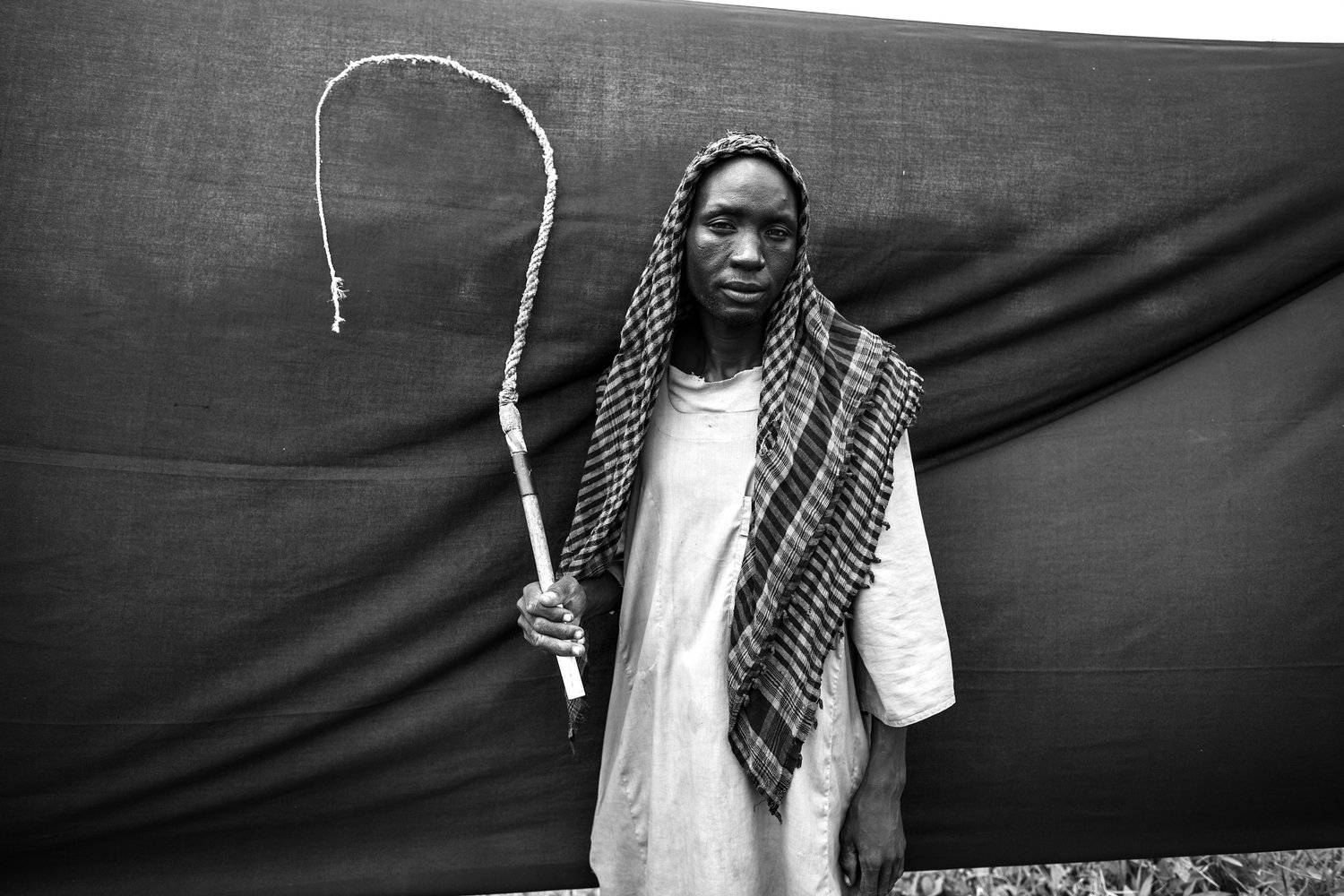
Bombed from the air, then fired on from the ground, hundreds of thousands of people in Sudan’s Blue Nile state began fleeing to safety in 2011. Here, 13 who found refuge in South Sudan present the most important things they carried with them.
In August 2012, while on assignment with UNHCR in South Sudan, photographer Brian Sokol began taking portraits of refugees holding the most important thing they carried with them when they fled their homes.
Shot in black and white, before a dark grey backdrop, these photos evoke a shared sense of urgency in escaping danger as well as the uniqueness of individual lives thrown in sudden disarray.
Together with UNHCR, Sokol has continued the series – titled “The Most Important Thing” – in several other countries. Its subjects include Syrian refugees in Iraq, Lebanon and Turkey as well as Malian refugees in Burkina Faso, Angolan refugees in the Democratic Republic of the Congo, and Rohingya refugees in Bangladesh.
In this set of portraits, taken in Doro and Jamam refugee camps South Sudan, Brian focuses on people displaced by conflict across the border in Sudan’s Blue Nile state.
In August 2012, while on assignment with UNHCR in South Sudan, photographer Brian Sokol began taking portraits of refugees holding the most important thing they carried with them when they fled their homes.
Shot in black and white, before a dark grey backdrop, these photos evoke a shared sense of urgency in escaping danger as well as the uniqueness of individual lives thrown in sudden disarray.
Together with UNHCR, Sokol has continued the series – titled “The Most Important Thing” – in several other countries. Its subjects include Syrian refugees in Iraq, Lebanon and Turkey as well as Malian refugees in Burkina Faso, Angolan refugees in the Democratic Republic of the Congo, and Rohingya refugees in Bangladesh.
In this set of portraits, taken in Doro and Jamam refugee camps South Sudan, Brian focuses on people displaced by conflict across the border in Sudan’s Blue Nile state.
Haja Tilim, 55
I arrived shoeless, carrying my granddaughter with this patterned shawl.
Haja carried her 18-month-old granddaughter, Bal Gaze, with this patterned shawl, called a ‘taupe’. She brought nothing else with her, not even shoes, during the family’s 25-day journey from Fadima village, in Sudan’s Blue Nile State, to the South Sudanese border. They fled the night a bomb was dropped on the home of her neighbour Issa Unis, who was killed instantly. She recalls, “I started to run while wearing my sandals, but they slowed me down, so I threw them on the side of the trail.”
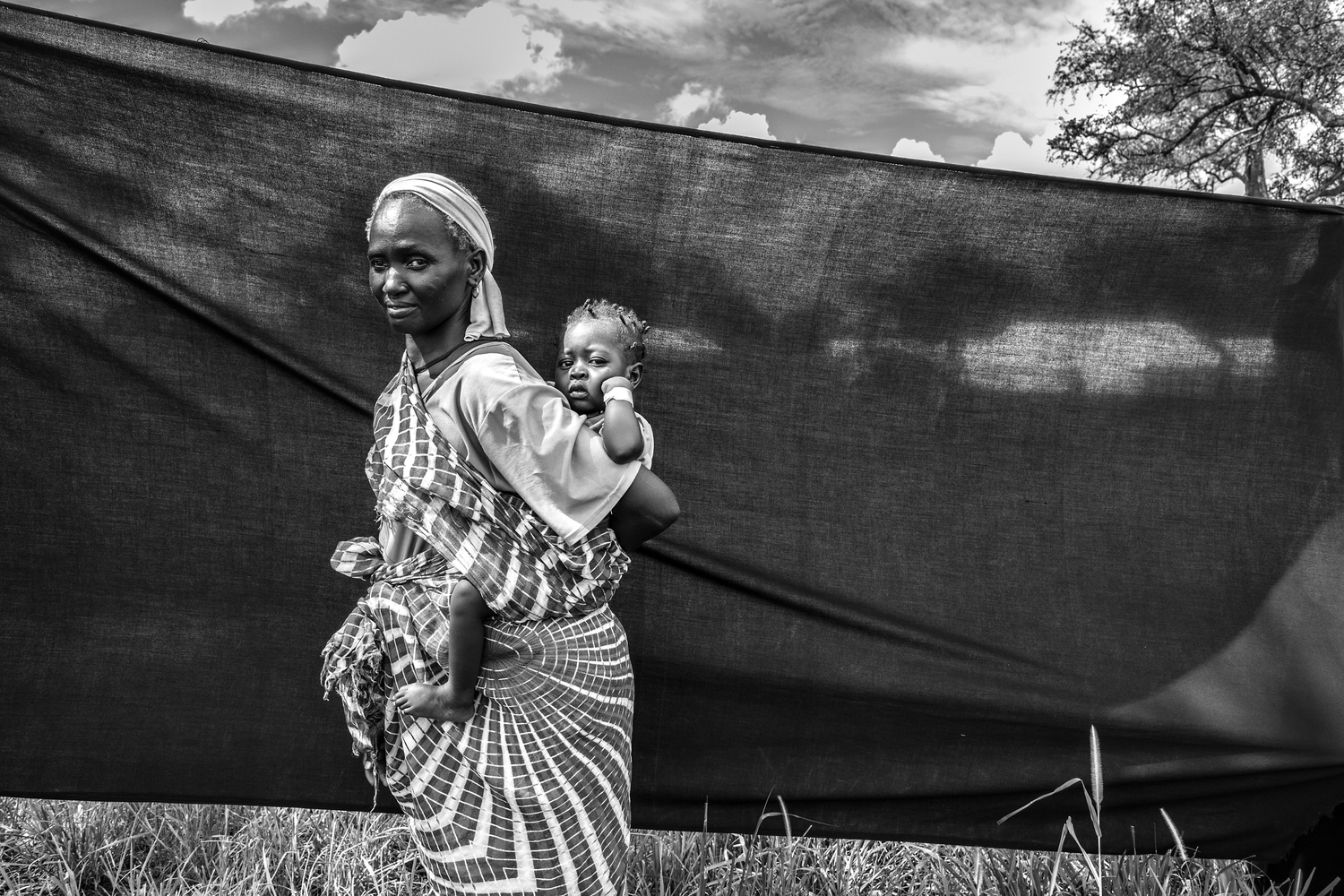
Haja Tilim, 55
I arrived shoeless, carrying my granddaughter with this patterned shawl.
Haja carried her 18-month-old granddaughter, Bal Gaze, with this patterned shawl, called a ‘taupe’. She brought nothing else with her, not even shoes, during the family’s 25-day journey from Fadima village, in Sudan’s Blue Nile State, to the South Sudanese border. They fled the night a bomb was dropped on the home of her neighbour Issa Unis, who was killed instantly. She recalls, “I started to run while wearing my sandals, but they slowed me down, so I threw them on the side of the trail.”
Ahmed Sadik, 10
I brought my best friend, Kako.
The most important thing Ahmed was able to bring with him is “Kako,” his pet monkey and best friend. Ahmed says that he couldn’t imagine life without Kako, and that the most difficult thing about leaving Blue Nile was having to leave behind his family’s donkey. Kako and Ahmed made the five-day journey from Taga to the South Sudanese border in the back of a truck. Ahmed and his family had to flee their home in Taga village, in Sudan’s Blue Nile State, amid prolonged aerial bombardments.
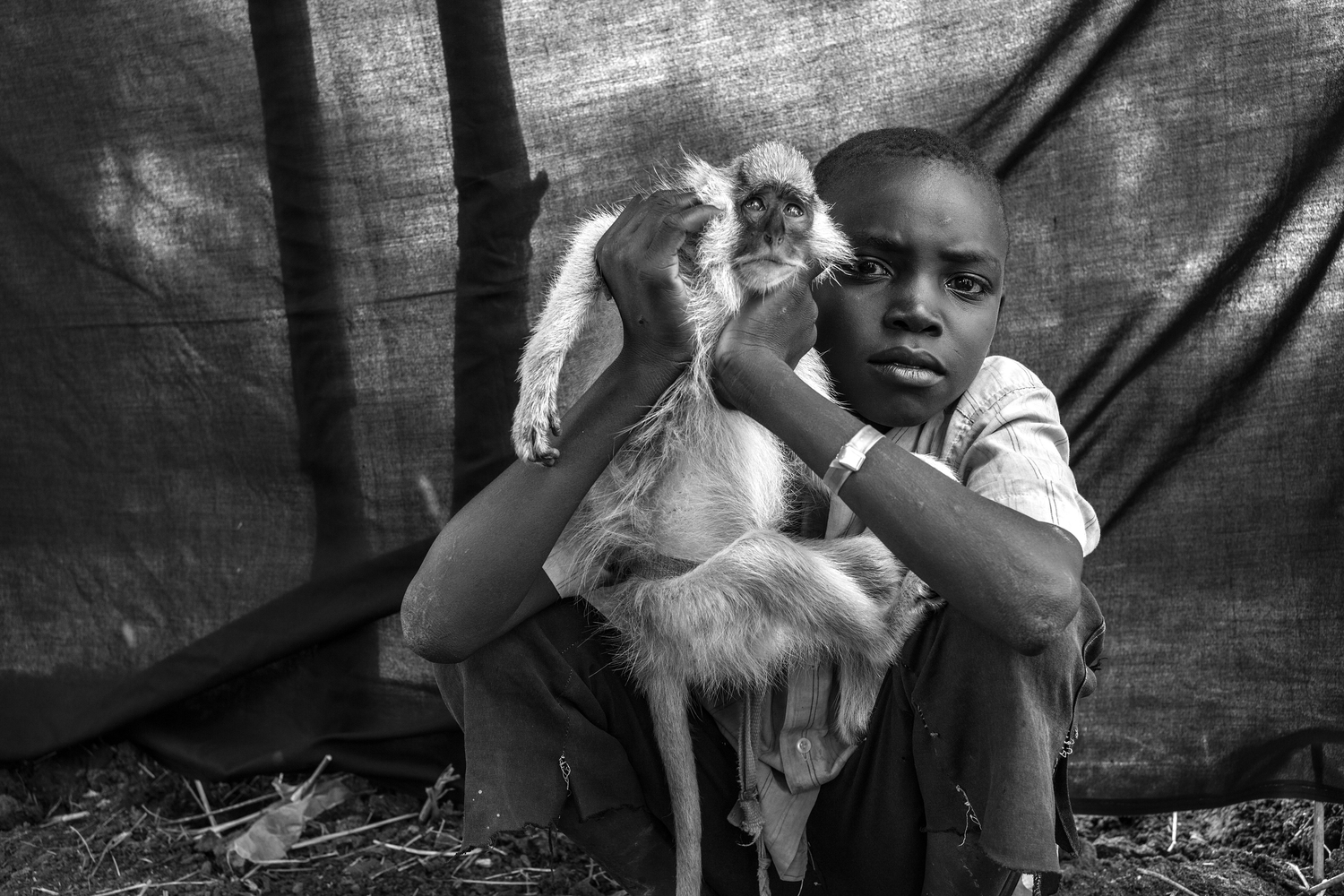
Ahmed Sadik, 10
I brought my best friend, Kako.
The most important thing Ahmed was able to bring with him is “Kako,” his pet monkey and best friend. Ahmed says that he couldn’t imagine life without Kako, and that the most difficult thing about leaving Blue Nile was having to leave behind his family’s donkey. Kako and Ahmed made the five-day journey from Taga to the South Sudanese border in the back of a truck. Ahmed and his family had to flee their home in Taga village, in Sudan’s Blue Nile State, amid prolonged aerial bombardments.
Magboola, 20
This cooking pot was small enough to carry, yet big enough to feed my family.
Magboola and her family weathered air raids for several months, but decided it was time to leave their village of Bofe, in Sudan’s Blue Nile state, the night that soldiers arrived and opened fire. With her three children, she travelled for 12 days from Bofe to the town of El Fudj, on the South Sudanese border. The most important thing she was able to bring with her is the cooking pot she holds in this photograph, taken at Jamam refugee camp, in South Sudan’s Maban County. It was small enough she could travel with it, yet big enough to cook sorghum for herself and her three daughters during their journey.
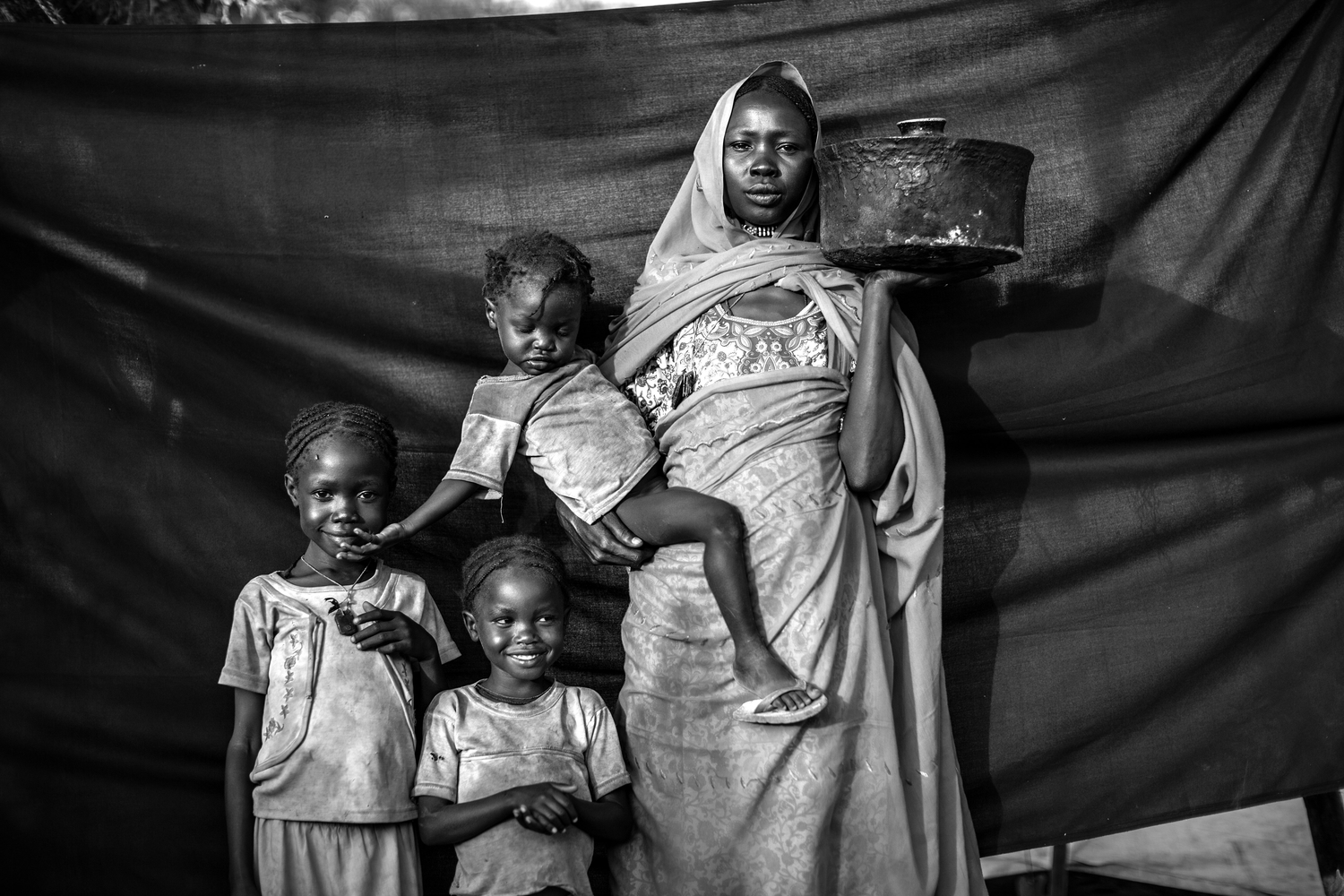
Magboola, 20
This cooking pot was small enough to carry, yet big enough to feed my family.
Magboola and her family weathered air raids for several months, but decided it was time to leave their village of Bofe, in Sudan’s Blue Nile state, the night that soldiers arrived and opened fire. With her three children, she travelled for 12 days from Bofe to the town of El Fudj, on the South Sudanese border. The most important thing she was able to bring with her is the cooking pot she holds in this photograph, taken at Jamam refugee camp, in South Sudan’s Maban County. It was small enough she could travel with it, yet big enough to cook sorghum for herself and her three daughters during their journey.
Howard Serad, 21
This knife kept my family and cattle safe along the way.
The most important thing Howard brought with him is this long knife, called a “shefe”. He used it to defend his family and his herd of 20 cattle during their 20-day journey from Bau County in Sudan to the South Sudanese border. Exchanges of gunfire and aerial bombardment forced Howard, with his wife and six children, to flee their home.
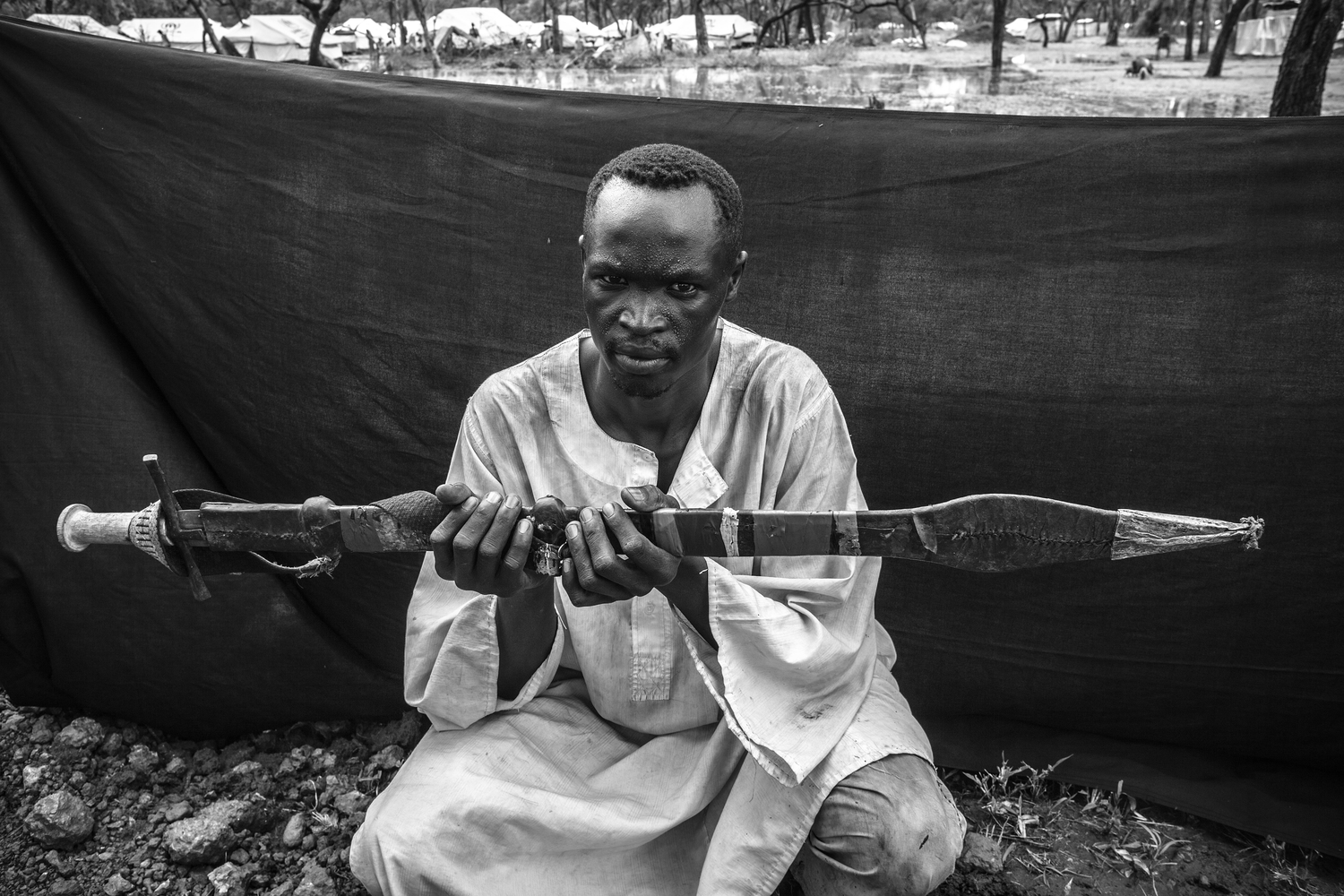
Howard Serad, 21
This knife kept my family and cattle safe along the way.
The most important thing Howard brought with him is this long knife, called a “shefe”. He used it to defend his family and his herd of 20 cattle during their 20-day journey from Bau County in Sudan to the South Sudanese border. Exchanges of gunfire and aerial bombardment forced Howard, with his wife and six children, to flee their home.
Shari, 75
“I’ve had this stick since I went blind six years ago.”
In September 2011, war came to Shari’s village in Bau County, in Sudan’s Blue Nile state. For five months she and her son, Osman, 40, went from village to village, trying to find safety. At times Shari grew so hungry that she ate the leaves of the lalof tree. Some of the friends and neighbours who accompanied them along the way died of illness or hunger. Shari and Osman reached Jamam refugee camp, in South Sudan’s Maban County, in February 2012. She says the most important thing she brought with her is the stick she holds. “I’ve had this stick since I went blind six years ago,” she said. “My son led me along the road with it. Without it, and him, I would be dead now.”
.
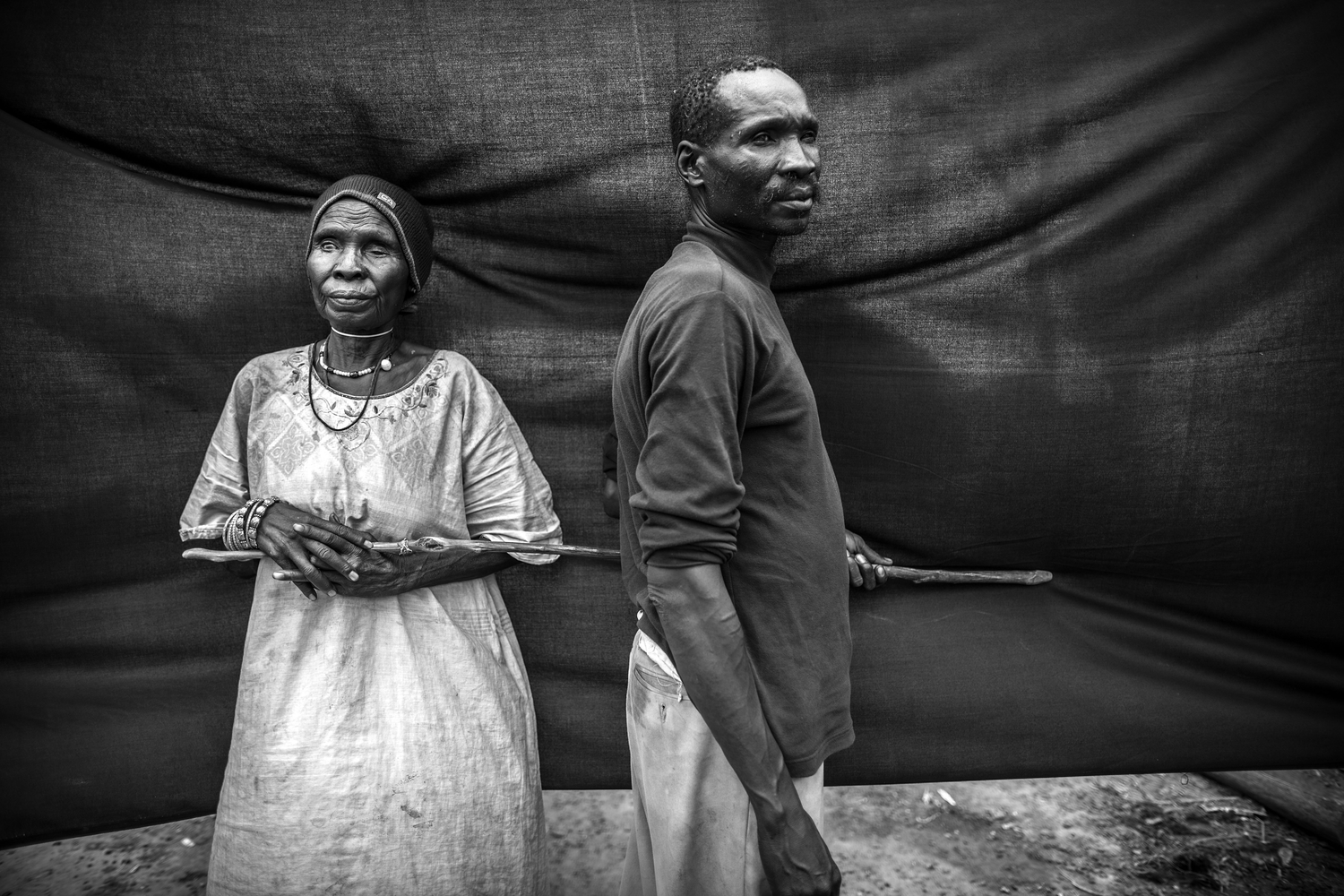
Shari, 75
“I’ve had this stick since I went blind six years ago.”
In September 2011, war came to Shari’s village in Bau County, in Sudan’s Blue Nile state. For five months she and her son, Osman, 40, went from village to village, trying to find safety. At times Shari grew so hungry that she ate the leaves of the lalof tree. Some of the friends and neighbours who accompanied them along the way died of illness or hunger. Shari and Osman reached Jamam refugee camp, in South Sudan’s Maban County, in February 2012. She says the most important thing she brought with her is the stick she holds. “I’ve had this stick since I went blind six years ago,” she said. “My son led me along the road with it. Without it, and him, I would be dead now.”
.
Dowla, 22
Bringing my children to safety was a balancing act.
Several months before this picture was taken, repeated bombing raids forced Dowla and her six children to flee their village in Sudan’s Blue Nile state. The most important object she was able to bring with her is the wooden pole balanced over her shoulder. She used it to carry her six children during the 10-day journey to Doro refugee camp, in South Sudan’s Maban County. At times, the children were too tired to walk, forcing her to carry two on either side.
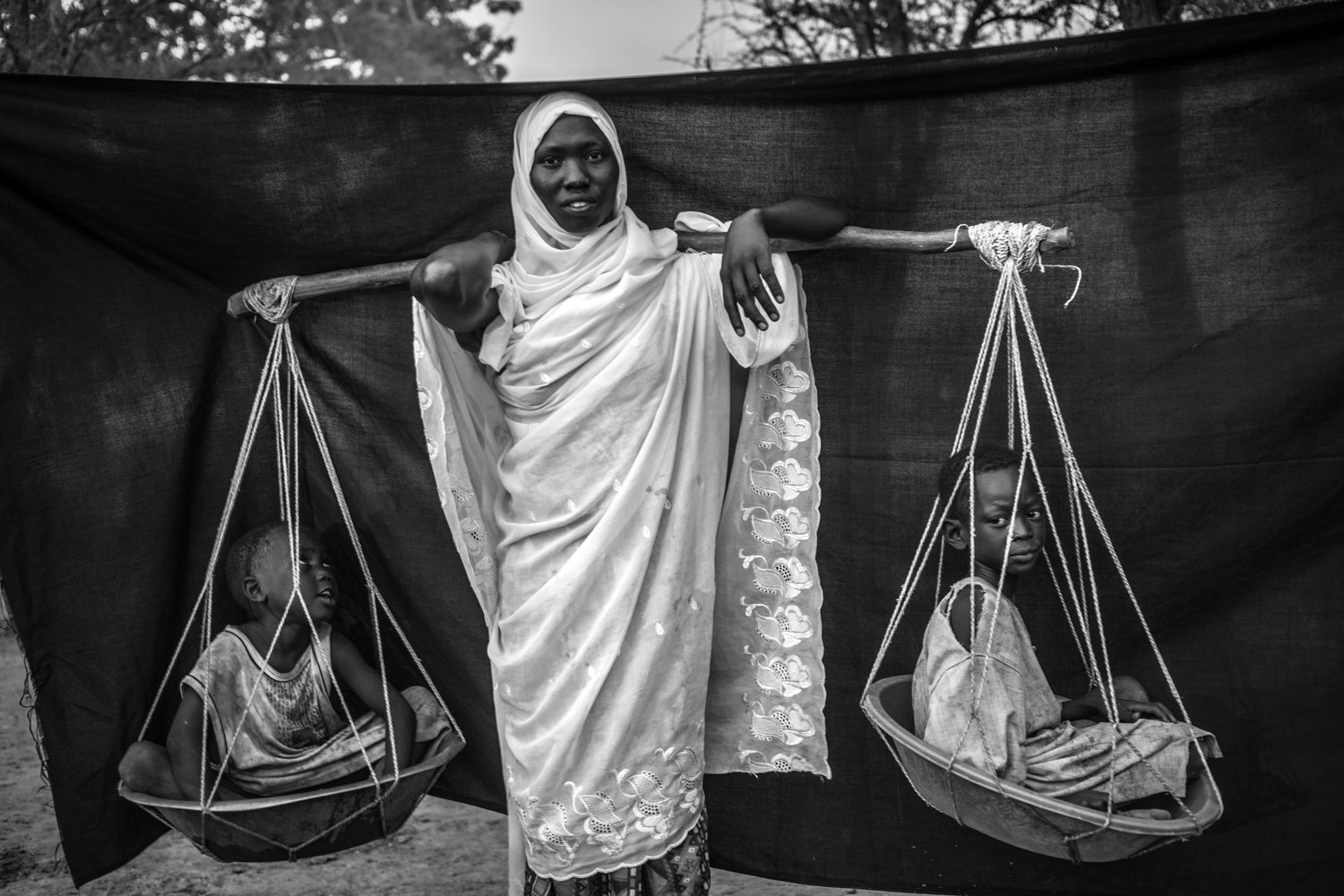
Dowla, 22
Bringing my children to safety was a balancing act.
Several months before this picture was taken, repeated bombing raids forced Dowla and her six children to flee their village in Sudan’s Blue Nile state. The most important object she was able to bring with her is the wooden pole balanced over her shoulder. She used it to carry her six children during the 10-day journey to Doro refugee camp, in South Sudan’s Maban County. At times, the children were too tired to walk, forcing her to carry two on either side.
Torjam Alamin, 85
One bottle carried drinking water, the other cooking oil.
As war came closer to Ahmar, his village in Sudan’s Blue Nile state, Torjam fled in search of safety in the nearby village of Kukur. But when the fighting followed him there, he and his family took off again during the night. The most important things he was able to bring with him were these plastic bottles. One carried drinking water, the other cooking oil. “All I could carry was this, and an axe,” says Torjam, seen here at Jamam refugee camp, in South Sudan’s Maban County. “We couldn’t bring much, and even had to leave some other old people behind.”
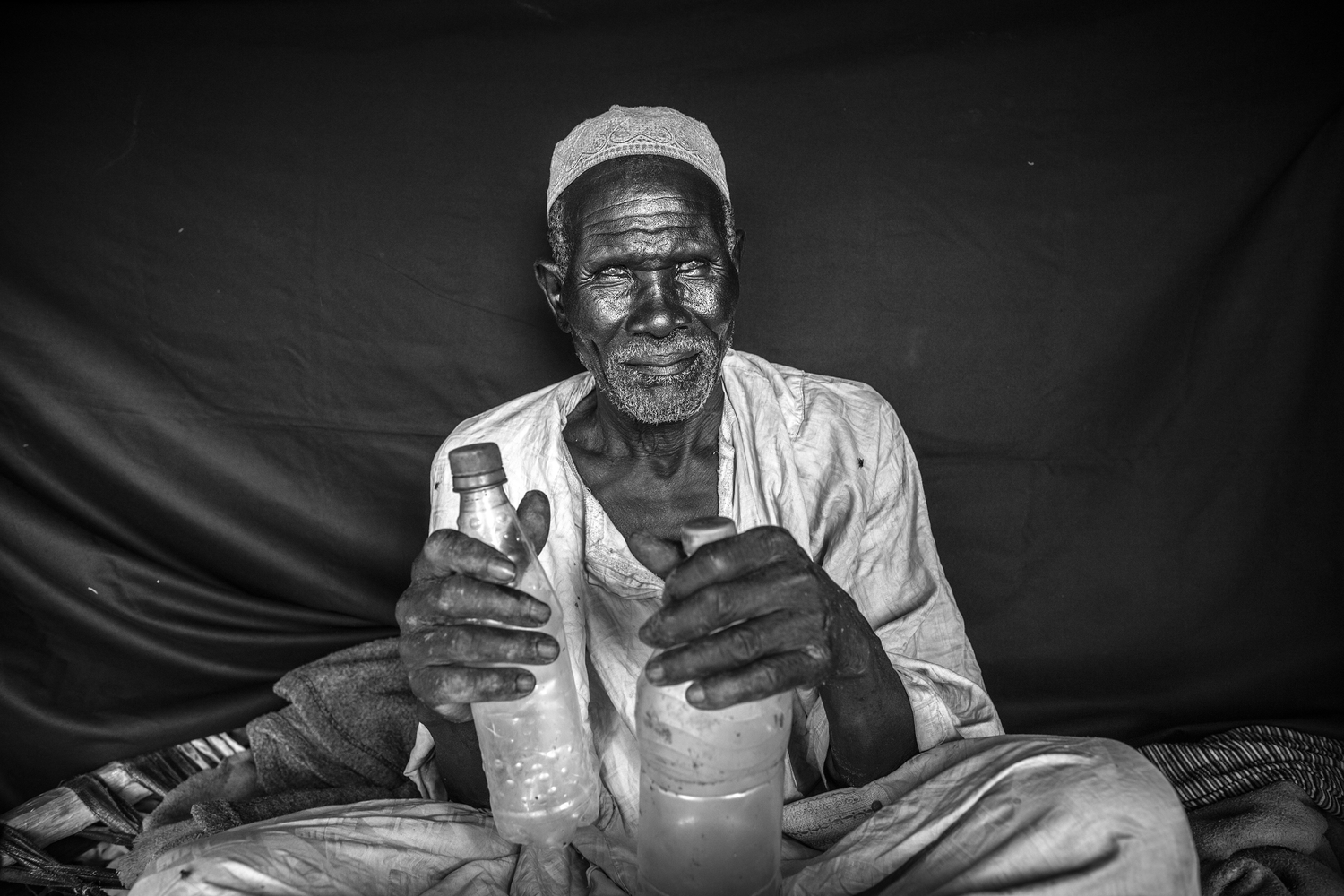
Torjam Alamin, 85
One bottle carried drinking water, the other cooking oil.
As war came closer to Ahmar, his village in Sudan’s Blue Nile state, Torjam fled in search of safety in the nearby village of Kukur. But when the fighting followed him there, he and his family took off again during the night. The most important things he was able to bring with him were these plastic bottles. One carried drinking water, the other cooking oil. “All I could carry was this, and an axe,” says Torjam, seen here at Jamam refugee camp, in South Sudan’s Maban County. “We couldn’t bring much, and even had to leave some other old people behind.”
Hasan Chata, over 60
Once full of cash, this wallet helped my family survive a weeks-long trek to safety.
Hasan is unsure of his age, but imagines he is between 60 and 70 years old. This empty wallet, he says, is the most important thing he carried when he fled fighting near Maganza, his village in Sudan’s Blue Nile State. When he left home, it held enough money to buy food for his family during their 25-day journey to the South Sudanese border. This photo was taken four months after their arrival in Jamam refugee camp, and Hasan’s wallet was empty.
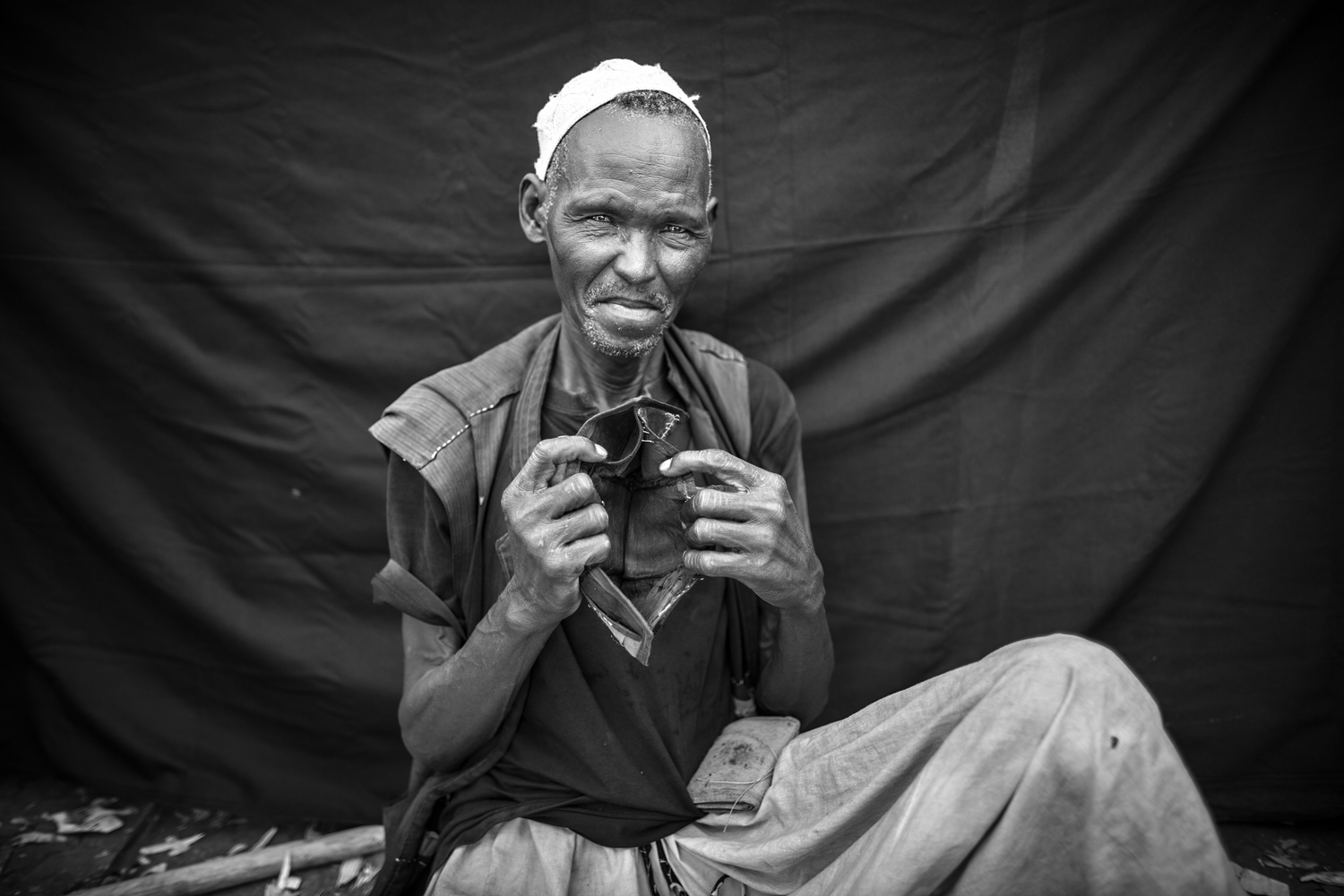
Hasan Chata, over 60
Once full of cash, this wallet helped my family survive a weeks-long trek to safety.
Hasan is unsure of his age, but imagines he is between 60 and 70 years old. This empty wallet, he says, is the most important thing he carried when he fled fighting near Maganza, his village in Sudan’s Blue Nile State. When he left home, it held enough money to buy food for his family during their 25-day journey to the South Sudanese border. This photo was taken four months after their arrival in Jamam refugee camp, and Hasan’s wallet was empty.
Al Haj Mattar Musu, 27
My herd of goats would have scattered if not for this whip.
Without this whip, Al Haj says he wouldn’t have been able to keep together his herd of 50 goats as he fled fighting in Sudan – and he would now be destitute. Al Haj travelled from Lahmar, his village in Sudan’s Blue Nile State, and found refuge in South Sudan. During his journey, he fell ill with malaria, making his escape even more challenging.

Al Haj Mattar Musu, 27
My herd of goats would have scattered if not for this whip.
Without this whip, Al Haj says he wouldn’t have been able to keep together his herd of 50 goats as he fled fighting in Sudan – and he would now be destitute. Al Haj travelled from Lahmar, his village in Sudan’s Blue Nile State, and found refuge in South Sudan. During his journey, he fell ill with malaria, making his escape even more challenging.
Maria Hamed, 10
On our three-month trek to safety, this jerrican was a lifeline.
The most important thing Maria carried with her was this water container, known as a jerrican. Four months before this photograph was taken, soldiers arrived in her village of Makaja, in Sudan’s Blue Nile State. In the middle of the night, they set fire to her house, burning it, and all the food inside, to the ground. The next day she set out, shoeless, for the South Sudanese border – a journey that would take her three months to complete. Along the way she contracted malaria, and at one point went five days without a meal.
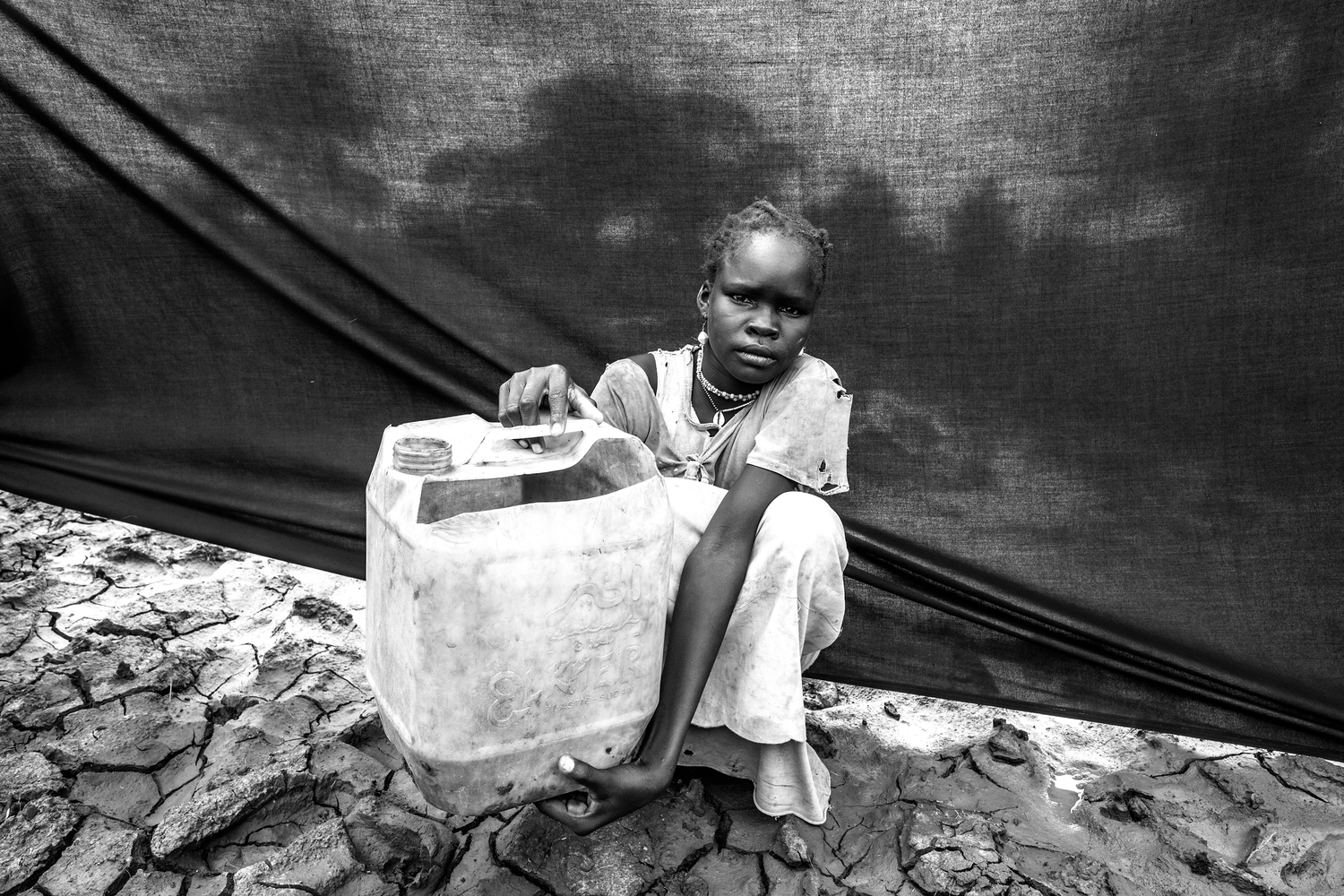
Maria Hamed, 10
On our three-month trek to safety, this jerrican was a lifeline.
The most important thing Maria carried with her was this water container, known as a jerrican. Four months before this photograph was taken, soldiers arrived in her village of Makaja, in Sudan’s Blue Nile State. In the middle of the night, they set fire to her house, burning it, and all the food inside, to the ground. The next day she set out, shoeless, for the South Sudanese border – a journey that would take her three months to complete. Along the way she contracted malaria, and at one point went five days without a meal.
Asha Babur, 28
“I just ran with what I was wearing.”
The most important things Asha was able to bring with her to Jamam refugee camp, in South Sudan, are the bracelets, or “kubasha,” she holds in this photograph. “I couldn’t carry anything with me. I just ran with what I was wearing. Everything I have now I bought in Jamam, except these bracelets, which are the only beautiful things I have from home.” She and her family endured months of aerial bombing raids, but when gun battles erupted in their village they knew they had to flee.
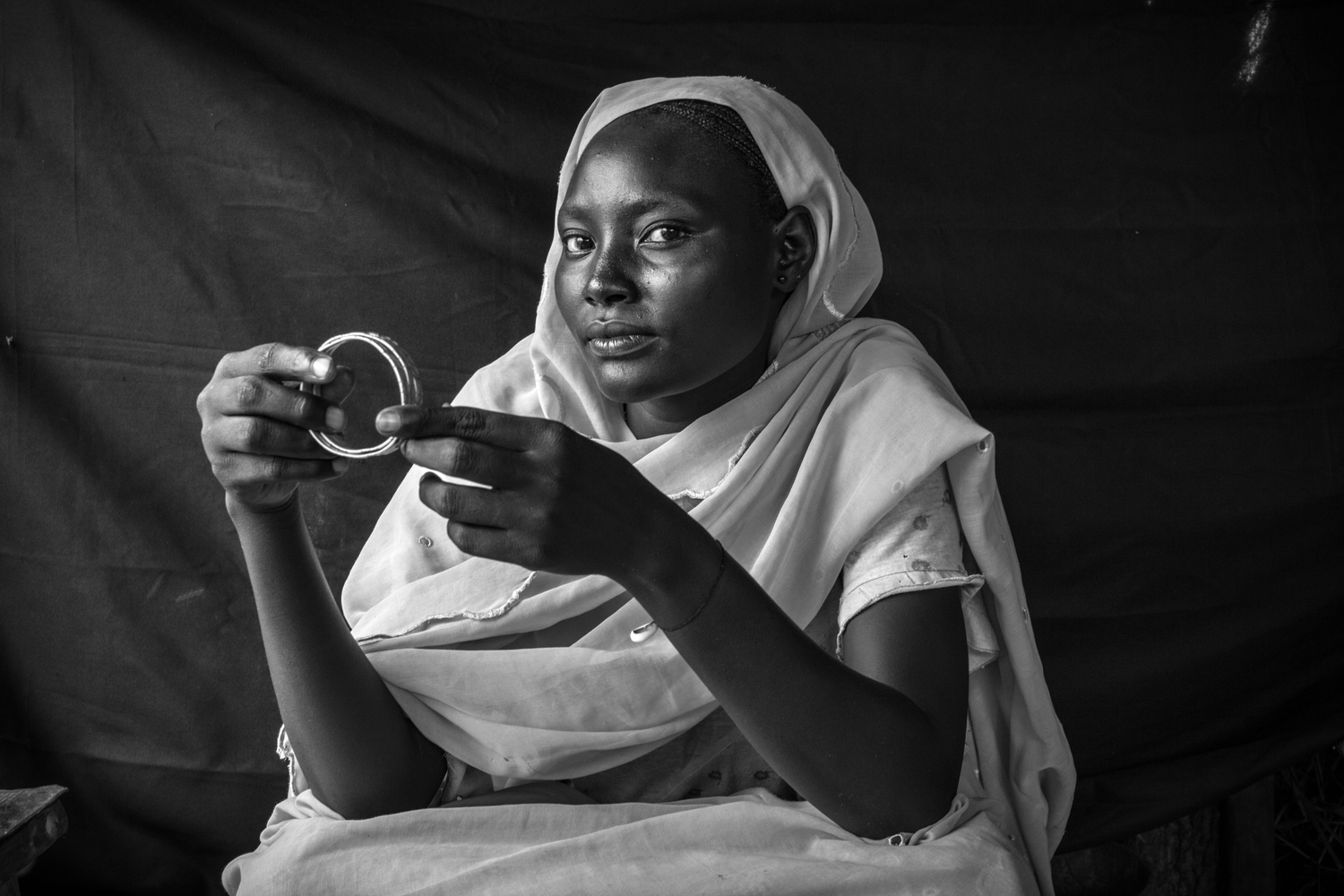
Asha Babur, 28
“I just ran with what I was wearing.”
The most important things Asha was able to bring with her to Jamam refugee camp, in South Sudan, are the bracelets, or “kubasha,” she holds in this photograph. “I couldn’t carry anything with me. I just ran with what I was wearing. Everything I have now I bought in Jamam, except these bracelets, which are the only beautiful things I have from home.” She and her family endured months of aerial bombing raids, but when gun battles erupted in their village they knew they had to flee.
Omar Belu Garmut, over 60
When we fled, this axe provided us with shelter and fuel for cooking.
Omar used this axe to cut firewood for cooking during his family’s escape from the conflict in Sudan’s Blue Nile state. He also used it to build small wooden structures where his family could sleep at night – and sometimes rest for days at a time – along the way. Before fleeing his village, Bofe, he was a farmer. He and his family weathered aerial bombing raids for several months, but decided it was time to leave their home and land when soldiers came in the night and opened fire. He and his family travelled for 12 days from to reach the town of El Fudj, on the South Sudanese border. Omar is unsure of his exact age, but believes himself to be between 60 and 70 years old.
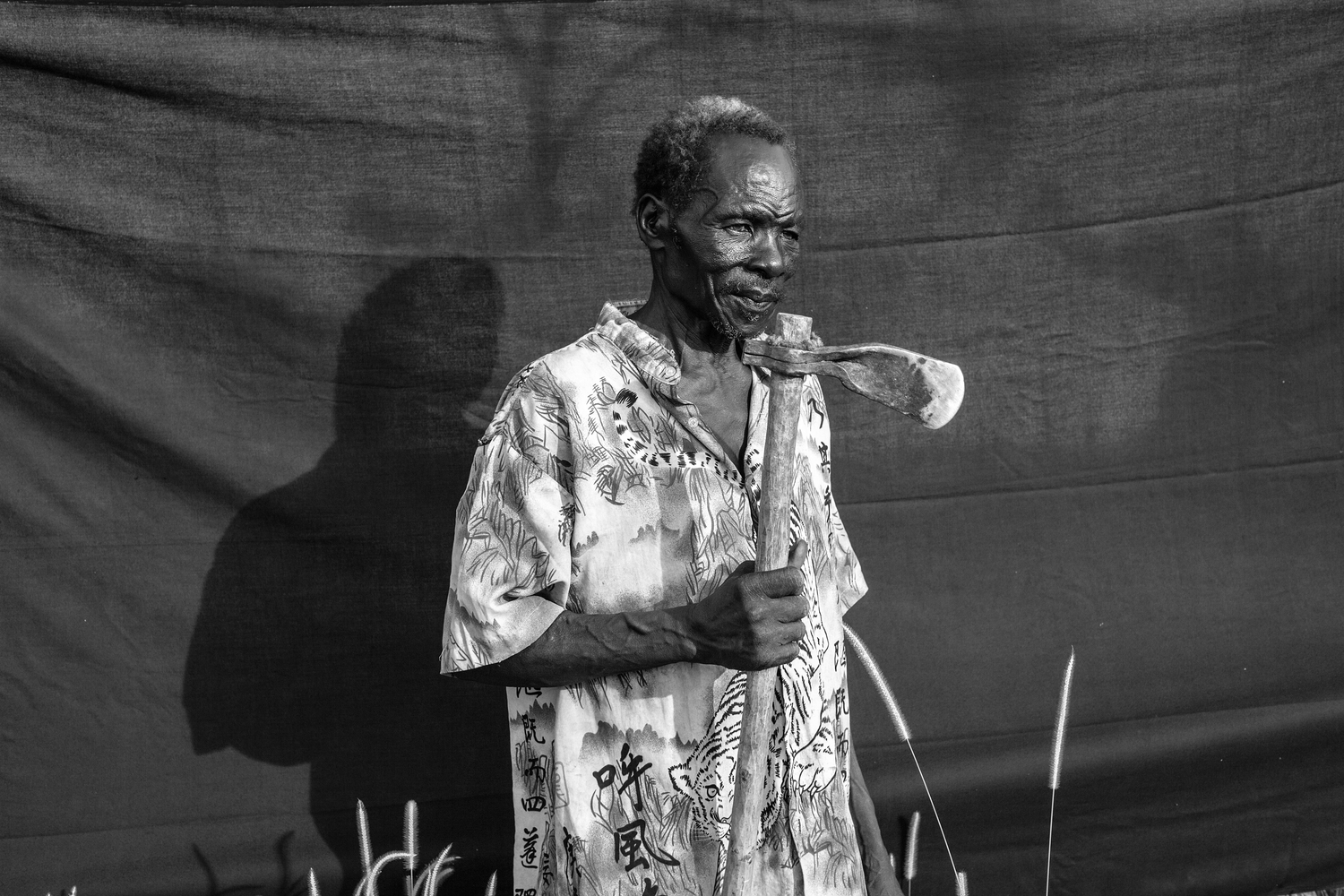
Omar Belu Garmut, over 60
When we fled, this axe provided us with shelter and fuel for cooking.
Omar used this axe to cut firewood for cooking during his family’s escape from the conflict in Sudan’s Blue Nile state. He also used it to build small wooden structures where his family could sleep at night – and sometimes rest for days at a time – along the way. Before fleeing his village, Bofe, he was a farmer. He and his family weathered aerial bombing raids for several months, but decided it was time to leave their home and land when soldiers came in the night and opened fire. He and his family travelled for 12 days from to reach the town of El Fudj, on the South Sudanese border. Omar is unsure of his exact age, but believes himself to be between 60 and 70 years old.
Taiba Yusuf, 15
I fled barefoot and empty-handed.
Unlike the other people pictured above, Taiba holds no object, as she made her journey empty-handed. Eight months before this photograph was taken, she fled from her village of Lahmar in Sudan’s Blue Nile State with nothing but the ragged clothing she was wearing. It took two months to reach South Sudan with her mother and five brothers. Often she went days at a time without food. She wore no shoes and lacked even a cup or a plastic bottle to carry water. She stayed alive by scavenging for fruits in the forest, and by begging for food and water from other refugees and in villages she passed through along the way. A case of tetanus took Taiba’s left arm four years ago, and now she is among the most vulnerable people seeking refuge in South Sudan’s Maban County. She no longer lives in fear, but says she still doesn’t have enough to eat.
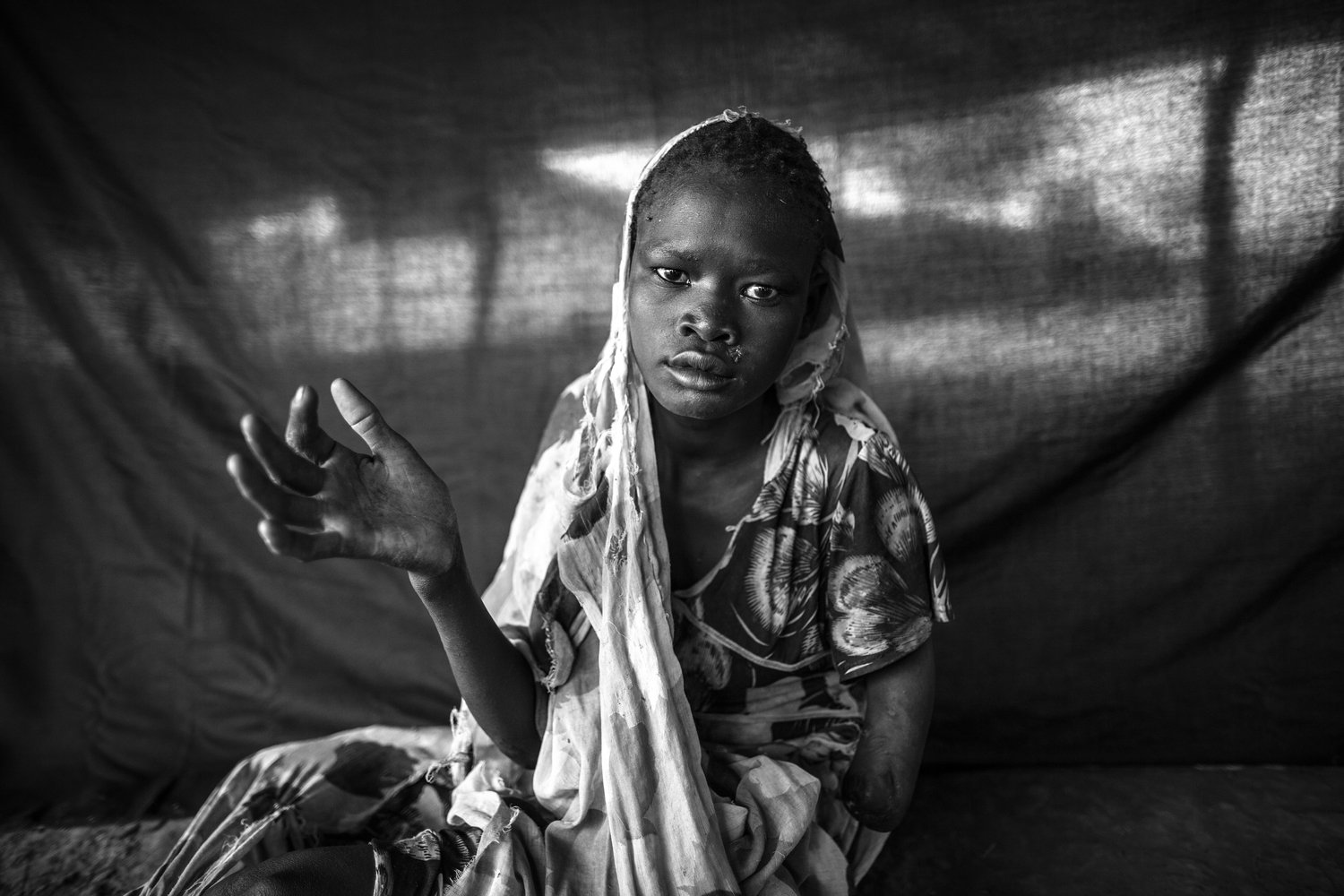
Taiba Yusuf, 15
I fled barefoot and empty-handed.
Unlike the other people pictured above, Taiba holds no object, as she made her journey empty-handed. Eight months before this photograph was taken, she fled from her village of Lahmar in Sudan’s Blue Nile State with nothing but the ragged clothing she was wearing. It took two months to reach South Sudan with her mother and five brothers. Often she went days at a time without food. She wore no shoes and lacked even a cup or a plastic bottle to carry water. She stayed alive by scavenging for fruits in the forest, and by begging for food and water from other refugees and in villages she passed through along the way. A case of tetanus took Taiba’s left arm four years ago, and now she is among the most vulnerable people seeking refuge in South Sudan’s Maban County. She no longer lives in fear, but says she still doesn’t have enough to eat.
